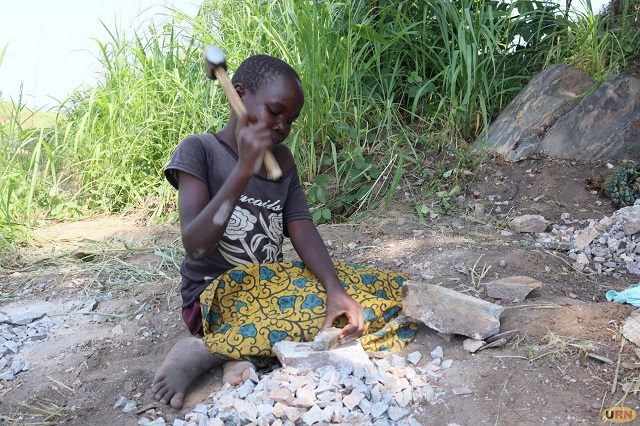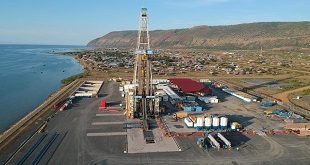
Gulu, Uganda | THE INDEPENDENT | Several primary school children in the Acholi sub-region are working in stone quarries and sand mining businesses as schools remain closed.
Schools were closed last week for 42 days following a surge in the number of covid-19 infections.
The children aged between 10 to 16 years are now working as casual labourers in quarries in some rural areas of Gulu, Kitgum and Pader districts.
Brenda Apiyo, 16, a resident of Atanga mission is among some of the children who are currently employed in the sand mining business along Ajan river in Pakeyo Parish, Laguti sub-county in Pader district.
Apiyo who sat her primary leaving examinations (PLE) in April this year says she had no option but to join sand quarrying to supplement her parent’s income. She says despite the long hours she endures to mine sand, it’s a rewarding venture because she can save some money daily.
Fiona Lakot, 13, a pupil at Atanga Primary School, also mining sand on Ajan river says she is helping out her parents who are currently financially handicapped. Lakot also reiterates that she wants to save money from her work for school fees and buying scholastic materials once school starts.
The children earn 45,000 Shillings from a full trip of sand on a good day when they get buyers.
But their mother Florence Adok denies claims that the children are being exploited at all. Adok says that the children are supplementing the family’s efforts in making more money for food and school fees at a time they are in partial lockdown.
She says the children are employed in sand mining as an alternative since the family’s main source of livelihood, agriculture has been affected by the current lack of rainfalls.
Justine Ocen, Latanya sub-county LC V councilor says whereas there are no cases of child exploitation in his area, child labour in any part of the district is unlawful and must be condemned by leaders.
He says although parents deserve to impart practical knowledge in form of work to their children, assigning children hard tasks such as sand mining and stone crushing for long hours in hard conditions is undeserving.
Ocen raised concerns that the environment and the kind of work the minors are subjected to is unhealthy for their lives.
David Okech, probation officer Pader district acknowledges receiving reports of child labour in the district but notes that it’s subject to investigation.
He notes that the repeated school closure is bound to trigger many problems among children, mostly young girls who are prone to early pregnancy.
Some parents however admit to using their children as a source of labour owing to the current partial lockdown instituted by the government which has limited their sources of income and left them poor.
George Opiyo, a father of five children and resident of Lakwela village in Paicho sub-county in Gulu district says three of his daughters are currently helping him to crush stones into gravel.
Opiyo says he used to earn just 700 Shillings from selling a jerry-can filled fully with stone gravel but with his daughters actively working, the family now earns thrice daily.
In Kitgum district, the use of children as labour in stone and sand quarries are visible in Tefoyo East in Mucwini sub-county, Lamola parish in Labongo Amida sub-county, Paibwor, and Pamolo parishes in Labongo Layamo sub-county.
Michael Ogweng, the Senior District Probation officer however blames parents for the growing numbers of children in stone and sand quarries. He says parents are using their children to offer cheap labour in rural and urban areas.
Ogweng says despite many cases of child labour happening in the district, few are reported by concerned citizens while the bulk of the case go silent under the watch of local leaders and parents who believe it’s a normal business.
In Lamwo district, a total of 48 children were in March this year rescued by the police while being transported to work as casual labourers in plantation farms in Bunyoro and Busoga regions.
A Human Rights Watch and Initiative for Social and Economic Rights (ISER) report released in May this year revealed that the unprecedented economic impact of the Covid-19 pandemic, together with school closures has pushed many children into exploitative and dangerous child labour in the country.
******
URN
 The Independent Uganda: You get the Truth we Pay the Price
The Independent Uganda: You get the Truth we Pay the Price


